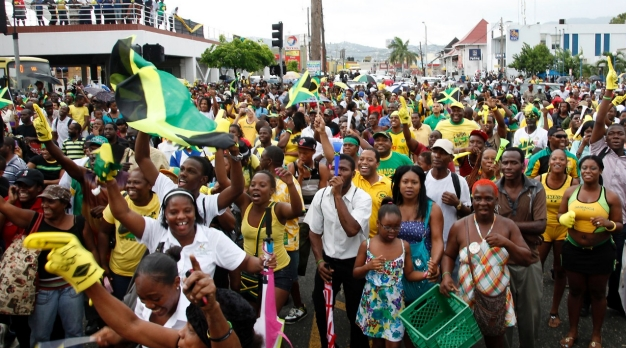
To Jamaica through spoken word
It’s called the musical island. And we love it for its music. I am referring to Sweet Jamaica. Be it reggae, ragga or dancehall, the melodies that have emanated from the bowels of Jamaica have serenaded the world.
Advertisement
The first week of August every year is a great time for the island nation. It starts on August 1st when they celebrate their Emancipation Day. This is then followed by the marking of Independence Day anniversary on August 6th from the Brits in 1962.
Here in Accra the growing community of Jamaicans did justice to this year’s event with a week long celebration at Jamrock Restaurant and Grill, a spot at East Legon.
On the evening of last Tuesday a culture gig that included patois dialogues, spoken word, book reading and some sassy African traditional dance performances by poets, Rhyme Sonny and Amarkai Amarteifio, also rocked the house with interesting renditions of their works.
What caught my attention were the Jamaican proverbs that draped the glass windows at the venue. Couched in patois, they were as interesting as they were African. Patois is a language akin to Pidgin English as spoken by our Nigerian cousins.
What I noticed really was that they were mostly related to the environment and the natural elements. Just as most African proverbs are, but what makes interesting reading is the rendition. E.g., ‘every hoe ha them stick a bush’, mi cum yah fi drink milk mi no cum yah fi count cow’, ‘si mi an cum live with mi a two different thing’
Perhaps we really shouldn’t be bothered about how familiar these sayings are. These are a people who came out of us. If we go looking for citizens across the world who reflect our identity most Jamaicans rank high.
‘I visited Jamaica a couple of years ago for the very first time and felt right at home. What hit me most was how very similar the people are to us here in Ghana’, said Elizabeth Olympio, who runs Jamrock with Raphael Emmanuel.
The place is a hub to link up and unwind after a hard day’s work. For those interested in Caribbean cuisine this is a haven. And I must add that the food here is not too different from Ghanaian dishes.
Food apart, Jamaicans also share folklore with us. “We grew up on Ananse stories, without knowing there is an equivalent somewhere in Africa. Ananse is part of Jamaican heritage, Raphael explained.
What is equally intriguing is the fact that the Adinkra symbol features in decorating some landmarks in that country, e.g. the national park. This symbol can be found at the bottom of the Park's perimeter.
Many of the slaves that were brought to Jamaica came from West Africa and so the architect, Kamau Kambui, thought it fit to pay tribute to our ancestors by incorporating West African Adinkra symbols in the design of the Park. But how important is Emancipation and Independence to Jamaicans? One needs to understand the history to appreciate.
Aside of the Arawak Indians, the original natives of the island who had become extinct, Jamaica was occupied by the Spanish. But the British fought them out. Natural disasters such as hurricanes as well as the diseases they contracted from the Spanish who held them captive for many years, virtually wiped out the Arawak Indians.
The English then looked towards the continent of Africa, where it was said that the Africans could withstand the heat and their bodies were more resistant to diseases. The majority of the slaves, who were taken from West Africa, endured a dreadful journey to the West Indies referred to as "The Middle Passage".
By the late 18th Century, it was noted that Jamaica had the largest number of slaves in the British West Indies and a most successful sugar industry.
There were however, a few members of the British Parliament who having seen the conditions in which the slaves were forced to live, were strongly opposed to slavery thus sparking an anti-slavery debate.
First came the abolition of the slave trade in 1808. In 1823, the Anti-Slavery Society was founded with the Quakers taking a prominent role along with a number of influential men like William Wilberforce, Granville Sharp and Thomas Clarkson.
Investigations and arguments by members of this society revealing the horrors of slavery, lead to the passing of the Emancipation Act on July 31, 1834 in the British West Indies at midnight. However, full freedom to all slaves was not granted until four years later by Queen Victoria of England on August 1, 1838.
Emancipation meant that Jamaica's over 300,000 slaves were now free to choose what they wanted to do with their lives. Eventually, Independence came in 1962.
Independence Day is a day of grand celebrations in Jamaica; from paying homage to the fallen heroes who fought for the independence of the country to indulging in entertainment, music, dance, and parades.



